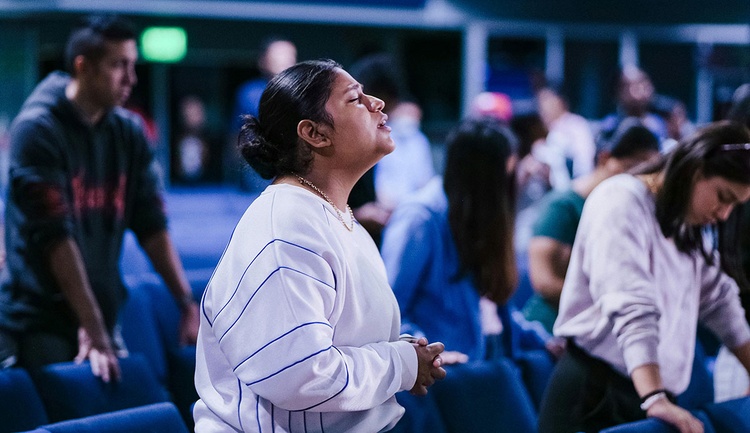Note from Randy: We have all been hurt by churches, and we have all hurt others, whether or not we know it. At a time when it is common to disparage churches, it’s good to celebrate the oneness many of us have so often felt in the presence of other believers.
One analogy God uses to describe His church is a bride preparing for marriage. To love Christ is to love His bride. He sees all the flaws in the church, but He hasn’t given up on His bride. Neither should we. That’s whyI love this article from Tim Challies, sharing about how he has enjoyed visiting different churches on his travels, and has felt at home worshipping there.
I have often had the same kind of experiences Tim has. Several months ago, I worshiped in a church of a denomination that was brand new to me. The singing and almost every part of the service was significantly different than in my home church, and yet, I found it delightful and endearing. God‘s Word was honored, the worship was heartfelt, and I sensed the presence of Jesus.
May Tim’s article remind us of God’s work happening all around the world, spreading His message and building His Church.
I Feel at Home in Your Church
It is one of the realities of the Christian faith that skeptics love to criticize—the reality that there are a host of different denominations and a multitude of different expressions of Christian worship. But while believers have become accustomed to responding to this criticism with a sense of shame, I choose to see it in a different light. I choose to see each tradition as highlighting different aspects of God’s purpose for the local church. As a prism refracts the light and separates it into its component colors, the differing traditions refract the Bible’s varying commands and emphases. And this is why I feel at home in so many different churches.
I feel at home in a Brethren church. I feel at home because of its commitment to simplicity in worship and to the necessity of celebrating the Lord’s Supper on a weekly basis. Such churches are meek and humble and committed to honoring the Lord in ways that may be unflashy but are faithful to the Scriptures. They look with longing and pleading for the return of Jesus Christ. I always count it a joy to break bread with the Brethren.
I feel at home in an Anglican church. It feels familiar because its worship is so thoroughly steeped in Word and prayer. While there is always a sermon (though probably one shorter than I am accustomed to) and while there is always song (though often fewer than I am accustomed to) the service is structured around reading the Word and both corporate and private prayers. I love to participate in those readings and prayers knowing that as I do so, I am engaged in a tradition that wraps the world and spans the centuries.
I feel at home in a Presbyterian church because of its commitment to sound doctrine and expositional preaching. Few traditions have raised up as many powerful preachers as the Presbyterians or created as many resources to assist them. Few traditions have thought as deeply about what they believe and described it as thoroughly as Presbyterians have done through their catechisms and confessions. Few documents in the history of the Christian church surpass the Shorter Catechism and the Westminster Confession for depth and beauty.
I feel at home also in those Presbyterian churches that hold to a strict interpretation of the regulative principle. Such churches will only worship in ways the Bible explicitly commands. I admire them for their commitment to principle even as it extends all the way to singing only the Psalms and singing them without instrumentation. Where so many other traditions neglect the psalms, this tradition sings them exclusively and joyfully. I feel at home among them.
I feel at home in a Dutch Reformed church because it values simple, formal worship followed by warm and charitable hospitality. I admire the way they give such care to catechizing their children and often to building and supporting schools to educate them. Plus, almost no church sings louder or stronger than a Dutch Reformed church. (If you want to find men who still sing with confidence and gusto, this is where you will find them.)
I feel at home in many non-denominational churches as well, though most fit at least one of the descriptions above or below. Every church has its reasons to formally associate with other churches or to remain independent, and I respect those who choose to persist outside a denominational structure.
Of course, I feel at home in a Baptist church, for I myself am Baptist. As I search the Scriptures for its instructions on what a local church ought to be and how it ought to worship, I see it describing something very much like a church structured around the London Baptist Confession. I love the emphasis on evangelism. I love the emphasis on celebrating the baptism of one who has professed faith in the Lord Jesus Christ. And I love the balance of structure and freedom that permeates its worship services.
And while I am confidently and convictionally Baptist, I do love to experience other churches and consider it a blessing to worship among other traditions that teach the same Scriptures and preach the same gospel. I have worshipped in a host of churches spanning every continent and have found that I love to learn from them all, I love to observe what they do so well, and I love to see how God blesses their labors to build his kingdom and declare his glory.
This article originally appeared on Challies.com and is used with permission of the author.
Photo: Pexels




